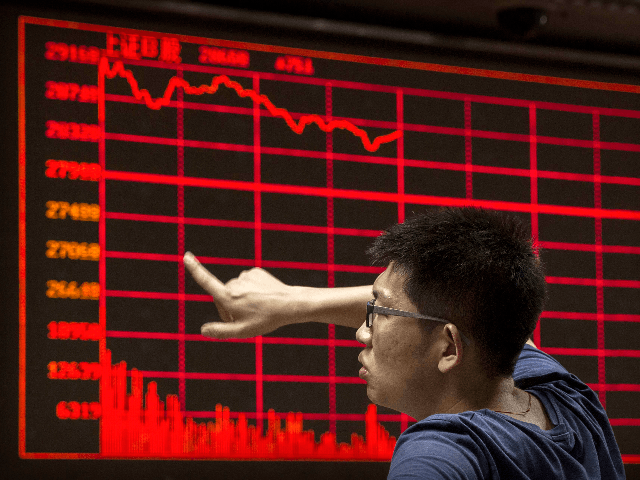Stocks and futures dropped across Asia, Europe, and the United States on Tuesday due to growing anxiety about the Chinese economy and the Communist regime’s refusal to deal honestly with its systemic problems.
The trigger for Tuesday’s stock slide was China announcing a much smaller interest rate reduction than anticipated. Reuters quoted economists who found Beijing’s policy moves profoundly disappointing, although some held out hope for strong action after the next Politburo meeting in July:
“The aim (of China’s rate cut) is to bolster lending, but investors appear a little underwhelmed by the action and are waiting until further moves promised to bolster the economy materialize,” said Susannah Streeter, head of money and markets at Hargreaves Lansdown.
Analysts at BofA global research said in a note that “such marginal easing” would likely help prevent growth from slowing sharply, but was “unlikely to offer a strong boost to reverse the growth slippage in the near future”.
Bloomberg News suggested bigger rate cuts were withheld for political reasons, specifically the reluctance of the Chinese regime to promote real estate speculation:
The one-year and five-year loan prime rates were reduced by 10 basis points each, according to a statement by the People’s Bank of China.
While that was in line with the reduction in the PBOC’s policy rates last week, some economists had predicted a bigger reduction of 15 basis points in the five-year rate, a reference for mortgages, to support the ailing housing market.
Reducing both rates by the same magnitude “shows policymakers wish to avoid sending an overly optimistic signal about the property market under the principle of ‘housing is for living, not speculation’,” said Bruce Pang, chief economist and head of research for Greater China at Jones Lang LaSalle Inc.
Investors were also unimpressed by Secretary of State Antony Blinken’s visit to Beijing, which produced little more than vague promises to “stabilize” U.S.-China relations.
“The meeting helped improve sentiment, but the market also understands that there’s strategic competition between the U.S. and China,” Saxo Markets strategist Redmond Wong told Reuters.
China's economic growth for 2022 is expected to have been among its weakest in four decades. https://t.co/DRDURVwAZc
— Breitbart News (@BreitbartNews) January 15, 2023
Oil prices likewise fell on Monday, even though OPEC is trying to push prices up by cutting output, and the Biden administration’s war on U.S. energy production continues. Pessimism about China’s economic recovery outweighed both of those factors, combined with a supply boost from Iran, pushing prices down by 48 or 49 cents a barrel even as supply tightens.
“Iran’s crude exports and oil output have hit record highs in 2023 despite U.S. sanctions, according to consultants, shipping data and a source close to the matter, adding to global supply when other producers are limiting output,” Reuters noted on Monday.
While many Western media outlets spoke of China’s post-pandemic recovery “sputtering” or “fizzling out,” CNBC quoted Julian Evans-Pritchard and Zichun Huang of Capital Economics making the case for stronger stimulus action coming after the July Politburo meeting:
On their own, 10bps cuts are too small to make a great deal of difference to monetary conditions, especially since market interbank rates are already below policy rates. But the PBOC [People’s Bank of China, the central bank] tends to use changes in policy rates as a signaling tool, with the heavy lifting being done by other tools such as adjustments to reserve requirements and bank loan quotas. The latest round of rate cuts suggests that these tools will be deployed too.
CNBC skeptically noted that most major financial organizations have downgraded their forecast for the Chinese economy for 2023 over the past few weeks and concluded that China “appears to be teetering on the brink of deflation as reopening optimism fizzles.”

COMMENTS
Please let us know if you're having issues with commenting.